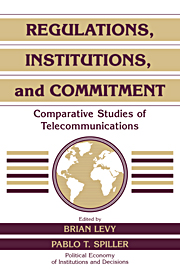Book contents
- Frontmatter
- Contents
- Foreword
- Series editor's preface
- Preface
- List of contributors
- 1 A framework for resolving the regulatory problem
- 2 Telecommunications regulation in Jamaica
- 3 The United Kingdom: A pacesetter in regulatory incentives
- 4 Chile: Regulatory specificity, credibility of commitment, and distributional demands
- 5 The political economy of the telecommunications sector in the Philippines
- 6 Argentina: The sequencing of privatization and regulation
- Notes
- References
- Index
2 - Telecommunications regulation in Jamaica
Published online by Cambridge University Press: 05 June 2012
- Frontmatter
- Contents
- Foreword
- Series editor's preface
- Preface
- List of contributors
- 1 A framework for resolving the regulatory problem
- 2 Telecommunications regulation in Jamaica
- 3 The United Kingdom: A pacesetter in regulatory incentives
- 4 Chile: Regulatory specificity, credibility of commitment, and distributional demands
- 5 The political economy of the telecommunications sector in the Philippines
- 6 Argentina: The sequencing of privatization and regulation
- Notes
- References
- Index
Summary
Jamaica tried several approaches to telecommunications regulations and experimented with both public and private ownership before settling in the late 1980s on private ownership and a new regulatory arrangement that seems to promote reasonably good performance in the sector and to be compatible with the country's institutions. Yet there is widespread public controversy about the current regulatory framework: a tight monopoly over all telecommunications services (including equipment supply), very little administrative discretion, and continuous price adjustments to satisfy what many consider too high a rate-of-return requirement. Should Jamaica change its regulatory system to one with greater institutional flexibility and fewer of the normative inefficiencies of rate-of-return regulation? Or, as the framework presented in Chapter 1 suggests, do Jamaica's institutional endowments explain the need for a system of rigid regulatory governance?
A traditional parliamentary government, strong judiciary, and strong two-party system, in which power is regularly transferred between the two parties, constrain the type of regulatory governance structure that can work well in Jamaica. A regulatory mechanism embedded in legislation of the U.S. style is too flexible and uncertain to provide the required safeguards for investment and growth in a system in which the rules of the game can change along with the government administration – or even within the same administration. If the courts rule that a particular administrative decision violates the regulatory statute, the government can overturn the ruling by passing new legislation.
- Type
- Chapter
- Information
- Regulations, Institutions, and CommitmentComparative Studies of Telecommunications, pp. 36 - 78Publisher: Cambridge University PressPrint publication year: 1996
- 3
- Cited by

